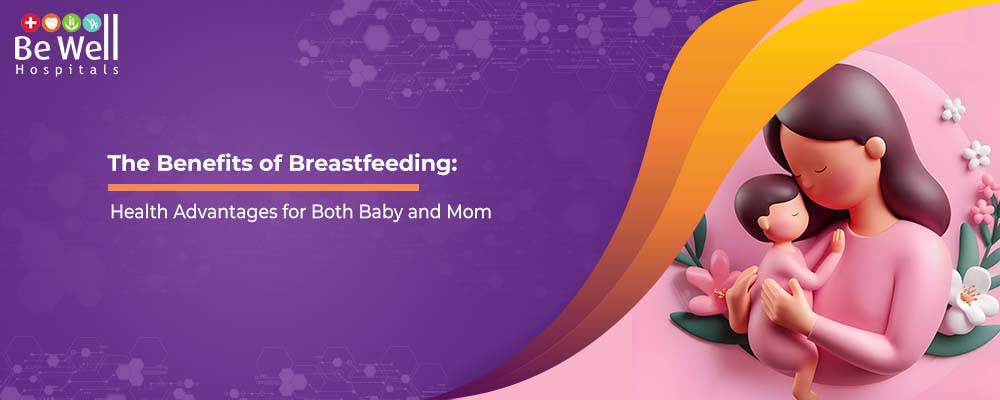The Benefits of Breastfeeding: Health Advantages for Both Baby and Mom

Introduction
Breastfeeding is a fundamental aspect of early childhood nutrition and development, providing unparalleled benefits for both infants and mothers. It is more than just a means of nourishment; breastfeeding fosters a unique bond between mother and child, laying the foundation for a healthy future. This blog will delve into the numerous health benefits of breastfeeding for the baby, exploring how it supports optimal growth, boosts the immune system, and promotes cognitive development. Additionally, we will discuss the significant health advantages for mothers, including physical recovery post-childbirth and long-term disease prevention. Finally, the blog will highlight the broader societal and familial impacts of breastfeeding, emphasizing its role in fostering a supportive, health-conscious community. Through this comprehensive exploration, we aim to underscore the vital importance of breastfeeding and encourage informed, supportive practices within families and communities.
Health Benefits for the Baby
Breastfeeding provides unparalleled benefits for infants, offering a perfect blend of nutrients and immune support that promotes optimal growth and development.
Embracing breastfeeding can profoundly impact a child's early development and set the foundation for a healthier future.
Health Benefits for the Mother
Breastfeeding offers significant benefits for new mothers, extending well beyond infant nutrition.
Embracing this natural process can lead to a healthier and more connected postpartum experience.
Challenges and Solutions
Breastfeeding, while highly beneficial, can present various challenges that may affect a mother’s ability to successfully nourish her baby.
Addressing common breastfeeding challenges through support and appropriate accommodations can significantly enhance the breastfeeding experience for mothers and their babies, promoting long-term health and well-being.
Myths and Misconceptions about Breastfeeding
Addressing common myths and misconceptions about breastfeeding is crucial for promoting accurate information and supportive practices.
Myth: Breastfeeding is too painful and not worth it.
Fact: While breastfeeding can be uncomfortable initially, most mothers find that the pain subsides after a few days or weeks. Proper latch and positioning can greatly reduce discomfort. The benefits of breastfeeding, including its nutritional and immunological advantages for the baby and the bonding experience for both mother and child, are well worth the initial adjustment period.
Myth: Breastfeeding makes it hard for a mother to return to work.
Fact: Many working mothers successfully continue breastfeeding by pumping milk and storing it for use when they are away from their baby. Employers are increasingly supporting breastfeeding by providing designated areas and flexible break times for nursing mothers.
Myth: Breastfeeding alone doesn’t provide sufficient nutrition.
Fact: Exclusive breastfeeding for the first six months provides all the necessary nutrients, vitamins, and minerals that an infant needs. Breast milk adjusts to meet the changing nutritional needs of the growing baby and contains antibodies that help protect against infections.
Myth: Formula feeding is just as good as breastfeeding.
Fact: While formula provides a suitable alternative, breast milk has unique components, such as antibodies and live cells, that help protect against infections and promote optimal health and development. Breastfeeding is also associated with lower risks of certain chronic conditions for both baby and mother.
Myth: Breastfeeding is only beneficial for the baby.
Fact: Breastfeeding offers numerous health benefits for mothers as well. It helps in postpartum weight loss, reduces the risk of certain cancers (such as breast and ovarian cancer), and promotes a quicker return to pre-pregnancy uterine size. Additionally, it fosters a strong emotional bond between mother and baby. Understanding these myths & facts fosters a more supportive environment for breastfeeding mothers and babies.
Conclusion
Breastfeeding offers a wealth of benefits for both mother and baby, from essential nutrition and immune support for the baby to aiding postpartum recovery and reducing cancer risks for the mother. It is crucial for new mothers to consider breastfeeding and seek support if needed to overcome any challenges they may face. Continued education and advocacy are essential to promote breastfeeding as a vital aspect of maternal and infant health.
For personalized support and guidance, visit Be Well Hospitals or call 9698 300 300 to book an appointment with our specialists. Your commitment to breastfeeding is a crucial step toward better health for both you and your baby.
